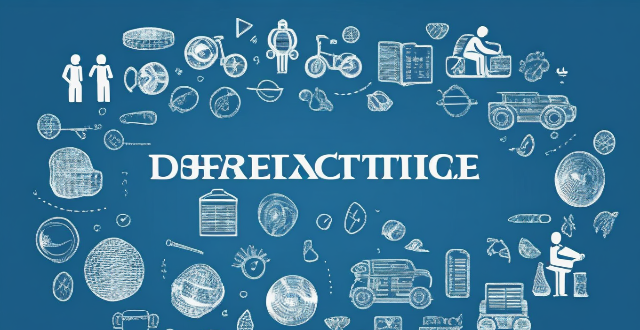Talent World

How do ESG considerations influence talent acquisition and retention ?
The text discusses how Environmental, Social, and Governance (ESG) considerations influence talent acquisition and retention. It states that companies are recognizing the value of incorporating ESG factors into their strategies to attract and retain top talent. The key points include attracting talent through ESG initiatives, retaining talent by aligning with personal values, benefits such as improved reputation and cost savings, challenges in balancing ESG with other priorities, and best practices for implementation. The conclusion emphasizes the importance of prioritizing ESG considerations while ensuring transparency and accountability in all aspects of ESG reporting.

How does the globalization of sports impact player recruitment and talent development ?
The globalization of sports has led to increased competition in player recruitment, diversification of talent pools, and the adoption of advanced training methods. This includes exposure to international markets, cultural exchange, geographic broadening, demographic variety, technological integration, scientific approaches, language and communication adaptation, and education and life skills development.

Can women play professional football ?
**Can Women Play Professional Football?** The topic discusses the possibility and reality of women playing professional football. It starts with a historical perspective, highlighting the early days when women were not allowed to participate in football due to societal norms and gender roles. However, the first recorded women's football match took place in 1895, despite opposition from male-dominated football associations. The development of women's football is also discussed, with the establishment of the Women's World Cup in 1991 marking a significant milestone for the sport. Professional leagues such as the National Women's Soccer League (NWSL) in the United States have provided opportunities for female players to earn a living through football. The skill and talent of female footballers are emphasized, stating that they possess the same level of skill and talent as their male counterparts. Many women have showcased their abilities on the world stage, earning recognition and respect from fans and peers alike. However, the topic also highlights the challenges faced by women in football, such as unequal pay and limited resources compared to men's teams. There is a need for continued advocacy and awareness to ensure that women's football receives the same level of attention and investment as men's football. In conclusion, women can indeed play professional football. They have demonstrated their skills and talents on various platforms, including international competitions like the Women's World Cup. While there is still room for improvement in terms of equality and resources, it is clear that female footballers are capable of competing at the highest level of the sport.

Can rigorous training compensate for natural talent in achieving high-level sports performance ?
In sports, the debate between natural talent and hard work continues. While some argue that raw talent is key to success, others believe rigorous training can overcome any lack of innate ability. The reality is that both factors play a significant role in achieving high-level sports performance. Natural talent often manifests itself in physical attributes such as strength, speed, agility, and endurance, giving athletes an advantage in certain sports. Mental acuity also plays a crucial role in athletic performance, with quick reflexes, strategic thinking, and calmness under pressure being important traits. However, rigorous training cannot be overlooked when it comes to achieving high-level sports performance. Through consistent practice and dedication, athletes can develop and refine their skills, making up for any deficiencies in natural talent. Rigorous training also improves an athlete's physical conditioning and mental toughness, essential for overcoming challenges and setbacks throughout their career. To maximize potential, coaches and trainers should adopt personalized approaches based on each athlete's unique strengths and weaknesses. This might involve focusing more heavily on skill development for those with less natural talent or emphasizing mental toughness training for athletes who already possess impressive physical attributes. By tailoring training programs to individual needs, athletes can make the most of their natural talents while simultaneously addressing areas where they may be lacking. Achieving high-level sports performance requires a commitment to continuous improvement. Whether an athlete relies more heavily on natural talent or rigorous training, there is always room for growth and development. By embracing this mindset and striving for excellence in all aspects of their game, athletes can push themselves to reach new heights and achieve success beyond what they may have initially thought possible.

What are the limitations of using AI for talent scouting and player evaluation ?
The limitations of using AI for talent scouting and player evaluation include the inability to account for intangibles such as emotional intelligence and team chemistry, reliance on potentially biased historical data, lack of human intuition in pattern recognition and contextual understanding, ethical concerns regarding privacy and fairness, cost and accessibility barriers, and legal and regulatory challenges related to data protection laws and intellectual property rights.

What are some examples of successful disability sports organizations or events around the world ?
Disability sports have been gaining popularity and recognition worldwide, with many organizations and events showcasing the talent and determination of athletes with disabilities. Here are some examples of successful disability sports organizations and events around the world: 1. Paralympic Games: An international multi-sport event for athletes with physical and intellectual disabilities, held immediately after the Olympic Games in the same host city. 2. Special Olympics World Games: A global event for athletes with intellectual disabilities, offering competition in various sports such as swimming, athletics, and basketball. 3. International Wheelchair Basketball Federation (IWBF): The governing body for wheelchair basketball worldwide, organizing international competitions and promoting the development of wheelchair basketball across different regions. 4. Cerebral Palsy Football World Cup: A biennial international football tournament for players with cerebral palsy, providing an opportunity for these athletes to showcase their skills and promote awareness about cerebral palsy. 5. International Blind Sports Association (IBSA): Dedicated to promoting sports for visually impaired athletes, organizing world championships and other events in various sports such as goalball, judo, and swimming. 6. World Deaf Volleyball Championships: An international competition for deaf volleyball players, promoting the development of deaf sports and providing a platform for deaf athletes to showcase their talent and compete at the highest level. 7. World Dwarf Games: A multi-sport event specifically designed for individuals with dwarfism, offering a range of sports such as swimming, track and field, and powerlifting, providing opportunities for athletes with dwarfism to compete and showcase their abilities.

How do inclusive policies benefit society as a whole ?
Inclusive policies are designed to promote equality, fairness, and social cohesion by eliminating barriers and discrimination. These policies benefit society as a whole by ensuring equal access to resources, services, and opportunities for all individuals regardless of their background, abilities, or circumstances. In addition to promoting equality and fairness, inclusive policies also enhance social cohesion by fostering a sense of belonging and mutual respect among different groups within society. This leads to reduced discrimination, increased tolerance, and strengthened community bonds. Inclusive policies also have positive economic outcomes by expanding the talent pool, reducing poverty, and stimulating consumer spending. Furthermore, these policies foster innovation and creativity by providing diverse perspectives, encouraging risk-taking, and promoting collaboration. Finally, inclusive policies can enhance a country's global competitiveness by attracting talent, improving international relations, and driving economic growth.

Which country has won the most FIFA World Cup titles ?
The country that has won the most FIFA World Cup titles is Brazil, with a total of five (5) titles. The Brazilian national football team is widely considered one of the most successful in the history of the sport. Other countries that have achieved significant success in the World Cup include Germany, Italy, Argentina, and Uruguay.

How can companies support the development of female leadership talent ?
Companies can support the development of female leadership talent by implementing a variety of strategies and programs that address the unique challenges faced by women in the workplace. Here are some key ways to foster female leadership: 1. Create a diverse and inclusive culture 2. Provide mentoring and sponsorship opportunities 3. Offer professional development programs 4. Foster a collaborative work environment 5. Set clear goals and measure success

Can you recommend some breathtaking yet less crowded hiking trails around the world ?
This guide recommends breathtaking yet less crowded hiking trails around the world, from the Sierra Nevada in California to the Himalayas in Nepal. It offers highlights and crowd avoidance tips for each trail.

What is the role of the World Health Organization (WHO) in promoting global health ?
The World Health Organization (WHO) plays a crucialThe World Health Organization (WHO) plays a crucial by providing leadership, setting norm WHO's work is focused on improving health outcomes worldwide through various activities such as convening stakeholders, establishing international standards for health, generating scientific knowledge to inform policy decisions, providing technical support to countries, and monitoring global health trends.

How does a company's commitment to climate-related CSR influence its ability to attract and retain top talent ?
The influence of climate-related CSR on talent attraction and retention is significant. Companies committed to environmental sustainability can attract environmentally conscious candidates, enhance their brand image, create an innovative work environment, provide fulfilling career opportunities, foster a positive work culture, and offer competitive compensation and benefits. This commitment helps retain high-performing employees who feel fulfilled by their work and share the company's vision for a better future.

What are the must-visit family-friendly attractions around the world ?
Traveling with family is an amazing experience that creates lasting memories. Here are some of the must-visit family-friendly attractions around the world: 1. Disneyland Paris, France 2. Universal Studios Hollywood, USA 3. Tokyo DisneySea, Japan 4. Legoland Deutschland, Germany 5. LEGOLAND Florida Resort, USA 6. Efteling, Netherlands

How can women overcome gender bias in the startup world ?
Gender bias is a pervasive issue in many industries, including the startup world. Women face unique challenges when it comes to funding, networking, and building their businesses. However, there are strategies that women can employ to overcome these obstacles and thrive in the startup world. Here are some tips: 1\. Build a Strong Network: Networking is crucial for any entrepreneur, but it's especially important for women who may not have as many natural connections in the industry. Attend industry events, join professional organizations, and connect with other entrepreneurs on social media. Make sure to diversify your network by seeking out people from different backgrounds and perspectives. 2\. Develop Your Skills: Take courses or attend workshops to develop your skills in areas such as finance, marketing, and management. This will not only make you a more well-rounded entrepreneur but also demonstrate your commitment to learning and growing. 3\. Be Confident and Assertive: Women are often socialized to be polite and deferential, which can sometimes hold them back in business settings. Practice being confident and assertive in meetings and negotiations. Remember that you deserve to be taken seriously and that your ideas and opinions are valuable. 4\. Seek Out Mentors and Advisors: Find mentors or advisors who can offer guidance and support as you navigate the startup world. Look for people who have experience in your industry and who share your values and goals. 5\. Leverage Your Strengths: Women often bring unique strengths to the table, such as empathy, collaboration, and creativity. Emphasize these qualities in your pitches and marketing materials, and don't be afraid to highlight how they set you apart from your competitors. 6\. Stay Persistent: Starting a business is hard work, and there will inevitably be setbacks along the way. Stay persistent and focused on your goals, even when faced with rejection or failure. Remember that every challenge is an opportunity to learn and grow. 7\. Advocate for Yourself and Others: Speak up about issues of gender bias and inequality whenever you see them. Use your platform to advocate for change within your industry and support other women who are facing similar challenges. By working together, we can create a more equitable and inclusive startup world for all entrepreneurs.

How can businesses benefit from investing in Climate-Smart Technologies ?
Businesses can benefit from investing in climate-smart technologies by improving efficiency, reducing costs, gaining a competitive edge, staying compliant with regulations, mitigating risks associated with climate change, and attracting talent.

What are the challenges faced by Fintech startups ?
Fintech startups face several challenges, includingFintech startups face several challenges, including, competition from established players, including regulatory compliance, security risks, competition from established players, talent acquisition and retention, and scaling and sustainability. These challenges can hinder their growth and success, but many Fintech startups continue to innovate and push the boundaries of what is possible in the world of finance.

Why is corporate social responsibility important for businesses ?
In full: Why Corporate Social Responsibility is Important for Businesses Corporate social responsibility (CSR) is crucial for businesses as it helps manage reputation, mitigate risks, foster innovation and competitive advantage, and attract and retain top talent. Companies that engage in socially responsible practices are seen as trustworthy, ethical, and caring by consumers, investors, and employees. This positive image can lead to increased customer loyalty, higher employee retention rates, and better access to capital. By adopting sustainable practices, companies can reduce their exposure to regulatory fines, lawsuits, and reputational damage resulting from environmental or social misconduct. CSR also encourages innovation and competitive advantage by promoting creativity and collaboration within organizations. Today's job seekers are increasingly looking for employers who share their values and demonstrate a commitment to making a positive impact on society and the environment. By embracing CSR, companies can attract and retain employees who are passionate about making a difference in the world. As consumers become more aware of the impact of business on society and the environment, companies that prioritize CSR will be well-positioned to succeed in the long run.

How can we encourage more disabled individuals to participate in sports ?
The text discusses the importance of encouraging more disabled individuals to participate in sports and outlines strategies for doing so. These include removing barriers such as improving accessibility and affordability, promoting inclusivity through awareness campaigns and community support, investing in training and development for coaches and athletes, integrating parasports into mainstream events, and establishing supportive policies and legislation. The goal is to create a world where sports are accessible to all, fostering communities that celebrate diversity and achievement in equal measure.

What is the correlation between immigration policies and entrepreneurship ?
Immigration policies significantly impact entrepreneurship by influencing talent access, regulatory environments, cultural diversity, and economic opportunities. Talent-friendly policies like Canada's Express Entry System and the U.S. H-1B Visa attract skilled immigrants, enhancing competitiveness. Supportive regulatory frameworks, such as Australia's Business Innovation and Investment Program and the UK's Tier 1 Entrepreneur Visa, simplify business establishment processes. Diversity-promoting policies, like New Zealand's Residence Programme and Germany's Blue Card EU, foster innovative solutions through varied perspectives. Economic opportunities arise from policies like Sweden's Startup Visa and Ireland's Startup Entrepreneur Programme, which create market gaps and support immigrant entrepreneurs. Governments should implement policies encouraging entrepreneurship among immigrants and local populations.

What are the benefits of adopting a climate leadership approach in business ?
Adopting a climate leadership approach in business is crucial for several reasons. Here are some benefits: 1. **Enhanced Reputation and Brand Image**: Companies that prioritize sustainability often enjoy enhanced reputations among consumers, investors, and the general public. This can lead to increased brand loyalty and customer satisfaction. 2. **Risk Management and Resilience**: A proactive approach to climate change helps businesses identify and mitigate potential risks associated with extreme weather events, supply chain disruptions, and regulatory changes. Investing in renewable energy sources, efficient infrastructure, and sustainable practices can make businesses more resilient to the impacts of climate change. 3. **Financial Performance and Cost Savings**: Implementing energy-efficient technologies and processes can lead to significant cost savings on utility bills. Many investors now prefer to invest in companies with strong environmental credentials, making it easier for these businesses to secure funding. Embracing climate leadership can also spur innovation, leading to the development of new products, services, or processes that generate additional revenue streams. 4. **Attracting and Retaining Talent**: Younger generations are passionate about working for companies that share their values on sustainability and social responsibility. Offering a workplace culture that aligns with personal values can improve employee satisfaction and reduce turnover rates. 5. **Compliance with Regulations and Reporting Requirements**: As governments around the world implement stricter environmental regulations, adopting a climate leadership approach ensures businesses stay ahead of these changes. Many stakeholders, including investors and consumers, now expect companies to report on their environmental impact. Being proactive in this area simplifies reporting requirements and demonstrates transparency.

Is it cost-effective for companies to invest in on-site fitness facilities for their workers ?
The text discusses whether it is cost-effective for companies to invest in on-site fitness facilities for their workers. The pros of investing include improved employee health and well-being, attracting and retaining top talent, and increased employee satisfaction and loyalty. However, the cons include high upfront costs, limited use and participation, and maintenance and management challenges. Ultimately, whether it is cost-effective depends on the specific needs and resources of each company.

Who won the last World Cup in football ?
The last World Cup in football was won by Argentina, with Lionel Messi leading the team to their third championship. Brazil also has a long history of success, with their last victory in 2002.

How can we encourage more people from diverse backgrounds to get involved in sports at all levels, from grassroots to professional ?
This discussion outlines a comprehensive approach to encouraging diversity in sports, including community outreach programs, infrastructure development, policy advocacy, corporate social responsibility, educational institution involvement, grassroots mobilization, and professional sports inclusion. Strategies include awareness campaigns, youth sports programs, accessible facilities, anti-discrimination laws, sponsorship and funding, employee engagement, school sports programs, university scholarships, community champions, cultural events, diversity in management, talent development pathways, data collection, and adaptive strategies. By implementing these strategies across multiple sectors, we can create a robust ecosystem that supports people from diverse backgrounds to participate in sports at all levels, fostering a more inclusive society through the unifying power of sports.

When is the next FIFA World Cup scheduled ?
The 2026 FIFA World Cup will be held from June 8 to July 19, 2026, in multiple cities across Canada, Mexico, and the United States. This marks the first time the tournament is hosted by more than one country, signaling a broader sharing of the event's benefits and fostering greater cultural exchange. The decision to expand hosting rights is expected to have significant economic and promotional impacts on football globally.